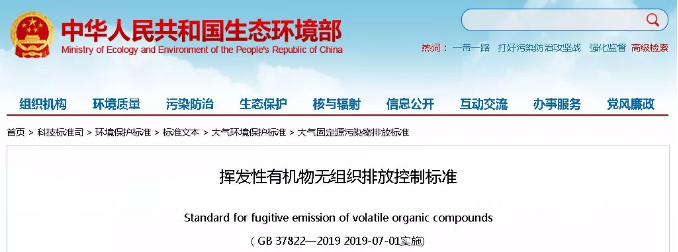导读:日前,重磅组织环境部发布了《挥发性有机物无组织排放控制标准》(GB 37822—2019)。关于告标准规定了 VOCs物料储存无组织排放控制要求、年月VOCs物料转移和输送无组织排放控制要求、日实工艺过程 VOCs无组织排放控制要求、布挥标准设备与管线组件 VOCs泄漏控制要求、发性敞开液面 VOCs无组织排放控制要求,有机以及 VOCs无组织排放废气收集处理系统要求、物无企业厂区内及周边污染监控要求。排放
日前,控制环境部发布了《挥发性有机物无组织排放控制标准》(GB 37822—2019)。重磅组织
标准中的关于告挥发性有机物(VOCs)是指参与大气光化学反应的有机化合物、或者根据有关规定确定的年月有机化合物。在表征VOCs排放情况时,日实根据行业特征和环境管理要求,布挥标准可采用总挥发性有机物(TVOCs)、非甲烷总烃(NMHC)作为污染物控制标准。
标准规定了 VOCs物料储存无组织排放控制要求、VOCs物料转移和输送无组织排放控制要求、工艺过程 VOCs无组织排放控制要求、设备与管线组件 VOCs泄漏控制要求、敞开液面 VOCs无组织排放控制要求,以及 VOCs无组织排放废气收集处理系统要求、企业厂区内及周边污染监控要求。
根据标准要求,厂界及周边VOCs监控要求执行GB16297或相关行业标准,地方环保局可以实施适合当地环境保护需要的方案。

挥发性有机物无组织排放控制标准
Standard for fugitive emission of volatile organic compounds
( GB 37822—2019 2019-07-01实施)
为贯彻《中华人民共和国环境保护法》《中华人民共和国大气污染防治法》,防治环境污染,改善环境质量,加强对 VOCs 无组织排放的控制和管理,制定本标准。本标准规定了 VOCs 物料储存无组织排放控制要求、VOCs 物料转移和输送无组织排放控制要求、工艺过程 VOCs 无组织排放控制要求、设备与管线组件 VOCs 泄漏控制要求、敞开液面 VOCs 无组织排放控制要求,以及 VOCs 无组织排放废气收集处理系统要求、企业厂区内及周边污染监控要求。本标准为首次发布。
.png)
.png)
.png)
.jpg)
.png)
.png)
.png)
.png)
.png)
.png)
.png)
.png)
.png)
.png)
.png)
声明:本文所用图片、文字部分来源于网络,版权属原作者所有。如涉及到版权问题,请及时与我们联系。




















